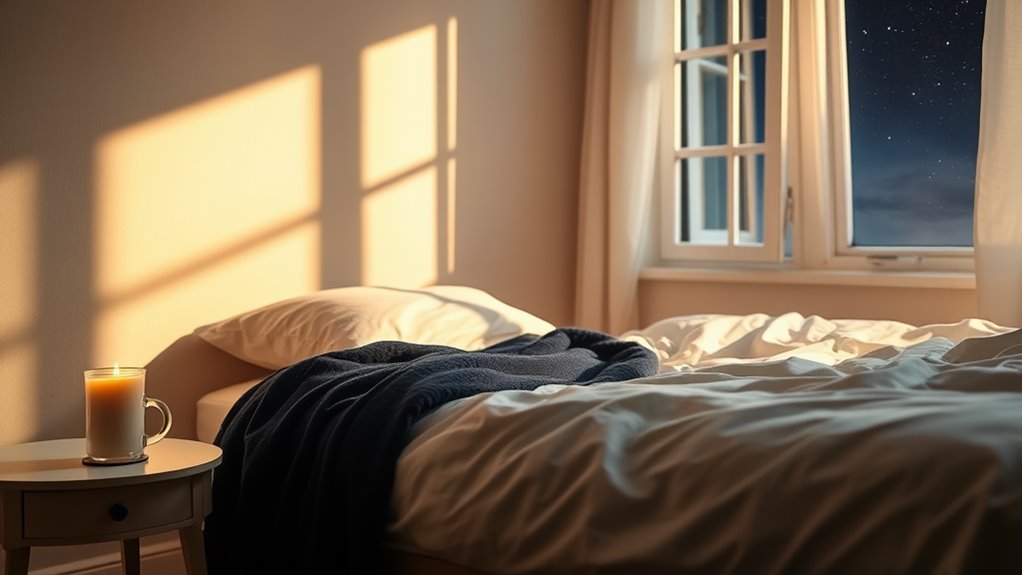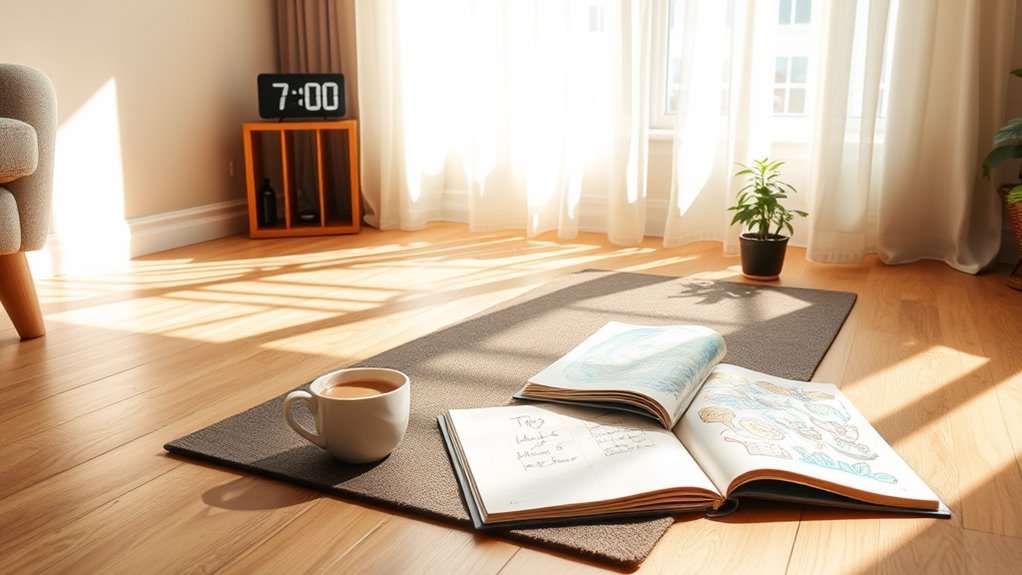The One Bedtime Habit That Will Help You Sleep Better Tonight
The one bedtime habit that’ll help you sleep better tonight is establishing a consistent bedtime routine. By signaling your body to wind down, you make it easier to shift into a restful state. Activities like reading, gentle stretching, or practicing mindfulness can quiet your mind and prepare you for sleep. Keep technology away and create a calming environment to enhance this routine. Want to explore more techniques for a peaceful night’s sleep?
Key Takeaways
- Establish a consistent bedtime routine to signal your body it’s time to wind down and prepare for sleep.
- Engage in relaxing activities, like reading or gentle stretching, to calm your mind and body before bed.
- Limit screen time and avoid stimulants like caffeine at least six hours before bedtime to promote better sleep quality.
- Create a soothing sleep environment by maintaining a cool temperature and using calming scents like lavender.
- Practice deep breathing exercises to reduce stress and ease into a restful state before sleeping.
Understanding the Importance of Sleep
Understanding the importance of sleep is essential for achieving better sleep and optimizing your daily performance. Quality sleep restores your energy, sharpens your focus, and boosts your mood.
It’s during these hours of deep rest that your body repairs itself, fortifying your immune system and reinforcing cognitive functions. Poor sleep can lead to a decline in productivity and creativity, hindering your potential. Additionally, prioritizing sleep can significantly enhance your overall well-being, which is vital for maintaining a balanced life.
By valuing sleep as a fundamental component of your health, you’re investing in long-term success.
The Science Behind Sleep Quality
Sleep quality greatly impacts how you feel and function each day. Understanding the science behind it can transform your nights. Here are three critical factors that contribute to sleep quality:
-
Sleep Cycles: Your body goes through various stages, including light sleep, deep sleep, and REM. Each stage plays an essential role in restoring your body and mind.
-
Circadian Rhythm: This internal clock regulates your sleep-wake cycle. A consistent schedule helps maintain balance, enhancing overall sleep quality.
-
Sleep Environment: Factors like light, noise, and temperature can considerably affect how well you sleep. Creating a conducive environment is essential for achieving restorative rest. Incorporating simple bedtime rituals can further enhance your sleep quality.
Master these elements, and you’ll pave the way for a more rejuvenating sleep experience.
Identifying Your Sleep Needs
To get better sleep, you first need to assess how much sleep your body really needs. Understanding your unique sleep cycle patterns and recognizing what makes you comfortable can help you find your ideal rest. Additionally, implementing practical tips that promote better sleep quality can significantly enhance your overall rest.
Assess Sleep Duration Requirements
Understanding your unique sleep needs is essential for optimizing your rest and overall well-being.
To assess your sleep duration requirements, consider these key factors:
-
Age: Your sleep needs change as you age. For instance, adults typically require 7-9 hours, while teens may need 8-10 hours.
-
Lifestyle: High-stress levels or intensive physical activity can increase your need for restorative sleep. Reflect on your daily routine and adjust your requirements accordingly.
-
Health: Chronic conditions or recent illnesses can impact sleep quality and duration. Regularly evaluate how you feel upon waking to determine if you need more sleep. Additionally, common sleep mistakes can hinder your ability to achieve restorative rest, so it’s important to be aware of them.
Understand Sleep Cycle Patterns
Recognizing your sleep cycle patterns is key to identifying your specific sleep needs. Your body goes through different stages of sleep, each serving distinct functions. Understanding these stages can help you optimize your rest and feel more refreshed. Additionally, incorporating simple nighttime rituals into your routine can significantly enhance your sleep quality.
| Sleep Stage | Duration (Minutes) | Function |
|---|---|---|
| NREM Stage 1 | 1-7 | Shift to sleep |
| NREM Stage 2 | 10-25 | Light sleep, body relaxes |
| NREM Stage 3 | 20-40 | Deep sleep, recovery occurs |
| REM Stage | 10-20 | Dreaming, memory consolidation |
| Cycle Duration | 90-110 | Complete sleep cycle |
Recognize Personal Comfort Factors
While you may be aware of the importance of sleep, pinpointing your personal comfort factors is essential in meeting your unique sleep needs.
Understanding what influences your rest can transform your sleep quality. Here are three key factors to evaluate:
-
Temperature: Experiment with your bedroom temperature to find your ideal range. Most people sleep best in a cooler environment.
-
Bedding: Invest in high-quality pillows and a mattress that suits your sleeping position, whether you’re a side, back, or stomach sleeper.
-
Lighting: Control light exposure by using blackout curtains or a sleep mask to create a dark, serene environment.
The Role of a Bedtime Routine
A consistent bedtime routine can significantly enhance your sleep quality, as it signals your body that it’s time to wind down.
By incorporating specific activities like reading, gentle stretching, or mindfulness exercises, you prepare your mind and body for rest.
Establishing a set time to start winding down each night helps regulate your internal clock, making it easier to fall asleep and wake up refreshed.
Avoid stimulating activities and screens close to bedtime; instead, focus on calming practices that promote relaxation.
The key is consistency—repeat the same sequence nightly to reinforce your body’s signals.
With dedication, you’ll master the art of a bedtime routine, paving the way for restorative sleep and improved overall well-being.
Creating a Relaxing Environment
To create a relaxing environment for sleep, start by decluttering your bedroom and choosing soothing colors for your decor.
A serene space can greatly enhance your sleep quality. Here are three key elements to focus on:
-
Lighting: Use soft, adjustable lighting to create a calm atmosphere. Dim lights signal your body that it’s time to wind down.
-
Temperature: Keep your room cool, ideally between 60-67°F (15-19°C). A comfortable temperature promotes deeper sleep.
-
Aromatherapy: Incorporate calming scents like lavender or chamomile. Essential oils can help signal relaxation and reduce stress.
Limiting Screen Time Before Bed
Limiting your screen time before bed can greatly improve your sleep quality.
The blue light from devices can interfere with your ability to fall asleep, so it’s smart to aim for at least an hour of screen-free time before hitting the pillow.
Instead, consider engaging in relaxing activities like reading or gentle stretching to help wind down.
Impact of Blue Light
As your day winds down, the blue light emitted from screens can greatly disrupt your sleep cycle. This light interferes with melatonin production, making it harder for you to fall asleep.
To mitigate its impact, consider implementing these strategies:
-
Limit Screen Exposure: Aim to reduce your screen time at least an hour before bed, allowing your mind to unwind.
-
Use Night Mode: Activate night mode on your devices, which reduces blue light emission and creates a warmer screen color.
-
Opt for Alternatives: Replace screen time with calming activities like reading a physical book, meditating, or journaling.
Recommended Screen-Free Duration
While you may not realize it, the amount of time you spend in front of screens before bed can considerably affect your ability to fall asleep.
To optimize your sleep, aim for at least 30 to 60 minutes of screen-free time before bedtime. This duration allows your body to unwind, reducing the impact of blue light on your circadian rhythms.
Use this time to create a calming pre-sleep routine that prepares your mind and body for rest. The more consistent you’re with this practice, the more you’ll train your brain to associate this period with relaxation and sleep.
Alternative Wind-Down Activities
To promote better sleep, consider incorporating alternative wind-down activities into your evening routine.
Stepping away from screens can enhance your relaxation and prepare your mind for rest. Here are three activities you can try:
-
Read a Book: Choose something enjoyable and engaging. This can transport you to another world and help quiet your mind.
-
Practice Mindfulness: Engage in meditation or deep breathing exercises. These techniques can reduce stress and ground you before sleep.
-
Gentle Stretching: Incorporate light stretches or yoga. This helps release tension in your muscles and signals your body that it’s time to wind down.
Experiment with these activities, and you’ll likely find a soothing passage into sleep that promotes restful nights.
Incorporating Relaxation Techniques
Creating a soothing bedtime routine can greatly enhance your sleep quality. To incorporate effective relaxation techniques, start with deep breathing exercises. Inhale slowly through your nose, hold for a moment, then exhale through your mouth. This practice calms your mind and signals your body to unwind.
Next, consider progressive muscle relaxation. Tense and then relax each muscle group, starting from your toes and working up to your head. This method releases physical tension and promotes tranquility.
You might also explore guided imagery. Visualize serene landscapes or peaceful scenarios to divert your thoughts from daily stressors.
Finally, gentle stretching can ease tension and prepare your body for rest. By integrating these techniques, you’ll cultivate a powerful pathway to restorative sleep.
The Benefits of Consistency
Establishing a consistent bedtime routine not only helps signal your body that it’s time to wind down, but it also reinforces your internal clock.
When you stick to a regular sleep schedule, you’ll experience several benefits:
-
Improved Sleep Quality: Consistency enhances your ability to fall asleep and stay asleep, leading to deeper rest.
-
Enhanced Daytime Alertness: A well-regulated sleep cycle boosts your energy levels, helping you stay focused and productive throughout the day.
-
Reduced Stress Levels: Knowing what to expect at bedtime calms your mind, making it easier to shift into sleep.
Avoiding Stimulants in the Evening
To sleep better, you need to be mindful of what you consume in the evening.
Cutting off caffeine a few hours before bedtime, limiting screen time, and being cautious with alcohol can all make a significant difference.
These changes can help create a more restful environment for sleep.
Caffeine Cutoff Time
Although you might enjoy that afternoon coffee or evening tea, consuming caffeine too close to bedtime can sabotage your sleep quality.
To guarantee a restful night, consider implementing a caffeine cutoff time. Here’s how to master your caffeine intake:
-
Set a Time Limit: Aim to stop consuming caffeine at least 6 hours before your planned bedtime.
-
Choose Alternatives: Opt for herbal teas or decaffeinated beverages in the evening to satisfy your cravings without the jitters.
-
Monitor Your Intake: Keep track of your daily caffeine consumption to identify any hidden sources, like chocolate or certain medications.
Evening Screen Time
As you wind down for the night, it’s important to be mindful of your evening screen time, since the blue light emitted by devices can interfere with your body’s natural sleep-wake cycle. Reducing screen exposure in the hours before bed can greatly enhance your sleep quality. Consider the strategies below to optimize your evening routine:
| Strategy | Description |
|---|---|
| Set a Screen Curfew | Turn off devices an hour before bed. |
| Use Blue Light Filters | Activate night mode on your devices. |
| Replace with Relaxing Activities | Engage in reading or meditation. |
| Create a Tech-Free Zone | Designate areas in your home without screens. |
| Stick to a Routine | Maintain consistent bedtime habits. |
Alcohol Impact on Sleep
While many people believe that a drink before bed can help them relax, alcohol actually disrupts sleep patterns and reduces overall sleep quality.
It may lead to lighter sleep and frequent awakenings, making restorative rest elusive.
To enhance your sleep, consider these three tips:
-
Limit Consumption: Aim to avoid alcohol in the hours leading up to bedtime. This can help your body achieve deeper sleep cycles.
-
Stay Hydrated: Alcohol can dehydrate you; drink water instead to maintain overall well-being.
-
Establish a Routine: Create a calming pre-sleep habit that doesn’t involve alcohol, such as reading or meditating.
Mindfulness and Sleep
When you practice mindfulness before bed, you can greatly enhance your sleep quality. This technique allows you to calm your mind and release the day’s stress.
Start by focusing on your breath; inhale deeply and exhale slowly, anchoring your awareness in the present moment. As thoughts arise, acknowledge them without judgment, then gently return your focus to your breathing.
You might also visualize a serene setting, immersing yourself in sensations of peace and tranquility. This process not only quiets your racing thoughts but also signals your body that it’s time to rest.
Tracking Your Sleep Patterns
Understanding your sleep patterns is essential for optimizing your rest and overall well-being. By tracking your sleep, you can identify habits that enhance or disrupt your slumber. Here’s how to get started:
-
Use a Sleep Tracker****: Invest in a wearable device or app to monitor your sleep cycles, duration, and quality.
-
Keep a Sleep Journal****: Note daily habits, including caffeine intake and screen time, to see how they impact your sleep.
-
Review and Adjust: Regularly analyze the data. If you notice patterns, make necessary adjustments—like changing your bedtime or creating a calming pre-sleep routine.
Frequently Asked Questions
What Is the Best Bedtime for Adults to Ensure Better Sleep?
Finding your ideal sleep time’s like discovering a hidden treasure. Aim for 7-9 hours of quality rest, ideally heading to bed between 10 PM and midnight. You’ll wake refreshed, ready to conquer the day ahead.
Can Diet Affect My Sleep Quality Significantly?
Yes, your diet can greatly affect your sleep quality. Consuming heavy meals, caffeine, or alcohol close to bedtime disrupts your sleep cycle, while balanced nutrition enhances relaxation and promotes deeper, restorative rest. Prioritize your food choices wisely.
How Does Exercise Impact My Sleep Routine?
Exercise greatly improves your sleep routine. When you engage in regular physical activity, you’ll find it easier to fall asleep, stay asleep, and wake up refreshed. Just be mindful of timing; too close to bedtime can disrupt sleep.
Are Naps Beneficial or Detrimental to Nighttime Sleep?
Imagine a delicate flower, blooming under the sun. Naps can nourish your daytime energy, yet too much can overshadow nighttime rest. Balance them wisely, and you’ll master the art of rejuvenating your sleep.
How Can I Tell if I Have a Sleep Disorder?
To determine if you have a sleep disorder, monitor your sleep patterns, note excessive daytime fatigue, and track any irregular behaviors during sleep. Consulting a sleep specialist can provide clarity and guarantee proper evaluation.





